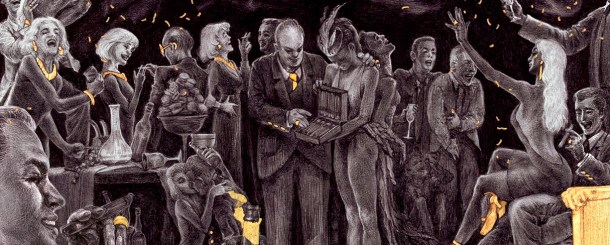“a crime committed by a person of respectability and high social status in the course of his occupation”*

Over the last two years, nearly every institution of American life has taken on the unmistakable stench of moral rot. Corporate behemoths like Boeing and Wells Fargo have traded blue-chip credibility for white-collar callousness. Elite universities are selling admission spots to the highest Hollywood bidder. Silicon Valley unicorns have revealed themselves as long cons (Theranos), venture-capital cremation devices (Uber, WeWork) or straightforward comic book supervillains (Facebook). Every week unearths a cabinet-level political scandal that would have defined any other presidency. From the blackouts in California to the bloated bonuses on Wall Street to the entire biography of Jeffrey Epstein, it is impossible to look around the country and not get the feeling that elites are slowly looting it.
And why wouldn’t they? The criminal justice system has given up all pretense that the crimes of the wealthy are worth taking seriously. In January 2019, white-collar prosecutions fell to their lowest level since researchers started tracking them in 1998. Even within the dwindling number of prosecutions, most are cases against low-level con artists and small-fry financial schemes. Since 2015, criminal penalties levied by the Justice Department have fallen from $3.6 billion to roughly $110 million. Illicit profits seized by the Securities and Exchange Commission have reportedly dropped by more than half. In 2018, a year when nearly 19,000 people were sentenced in federal court for drug crimes alone, prosecutors convicted just 37 corporate criminals who worked at firms with more than 50 employees.
With few exceptions, the only rich people America prosecutes anymore are those who victimize their fellow elites. Pharma frat boy Martin Shkreli, to pick just one example, wasn’t prosecuted for hiking the price of a drug used to treat HIV from $13.50 to $750 per pill. He went to prison for scamming investors in a hedge fund scheme years before. Meanwhile, in 2016, the CEO whose company experienced the deadliest mining disaster since 1970 served less than one year in prison and paid a fine of 1.4 percent of his salary and stock bonuses the previous year. Why? Because overseeing a company that ignores warnings and causes the deaths of workers, even 29 of them, is a misdemeanor…
A bracing look at an alarming phenomenon, and at the forces that drive it: “The Golden Age of White Collar Crime.”
See also this interactive “heat map” of “White Collar Crime Risk Zones,” from @sam_lavigne and his colleagues, and this paper on the cost of white collar crime– more than $300 Billion per year as of 2015; likely more now– and who pays for it (HBS pdf).
 [Paul Noth in The New Yorker, via Jack Shalom]
[Paul Noth in The New Yorker, via Jack Shalom]
* Criminologist Edwin Sutherland’s definition of white collar crime, 1939
###
As we equilibrate equity, we might recall that it was on this date in 1933, the day after the German Parliament building (the Reichstag) was damaged by arson, that President Hindenburg issues the Decree for the Protection of People and the Reich…
Though the origins of the fire are still unclear, in a propaganda maneuver, the coalition government (made up of Nazis and the Nationalists) blamed the Communists. They exploited the Reichstag fire to secure President Hindenburg’s approval for an emergency decree, popularly known as the Reichstag Fire Decree, that suspended individual rights and due process of law. The Reichstag Fire Decree permitted the regime to arrest and incarcerate political opponents without specific charge, dissolve political organizations, and to suppress publications. It also gave the central government the authority to overrule state and local laws and overthrow state and local governments. The decree was a key step in the establishment of the Nazi dictatorship. Germany became a police state in which citizens enjoyed no guaranteed basic rights and the SS, the elite guard of the Nazi state, wielded increasing authority through its control over the police. [source]

You must be logged in to post a comment.